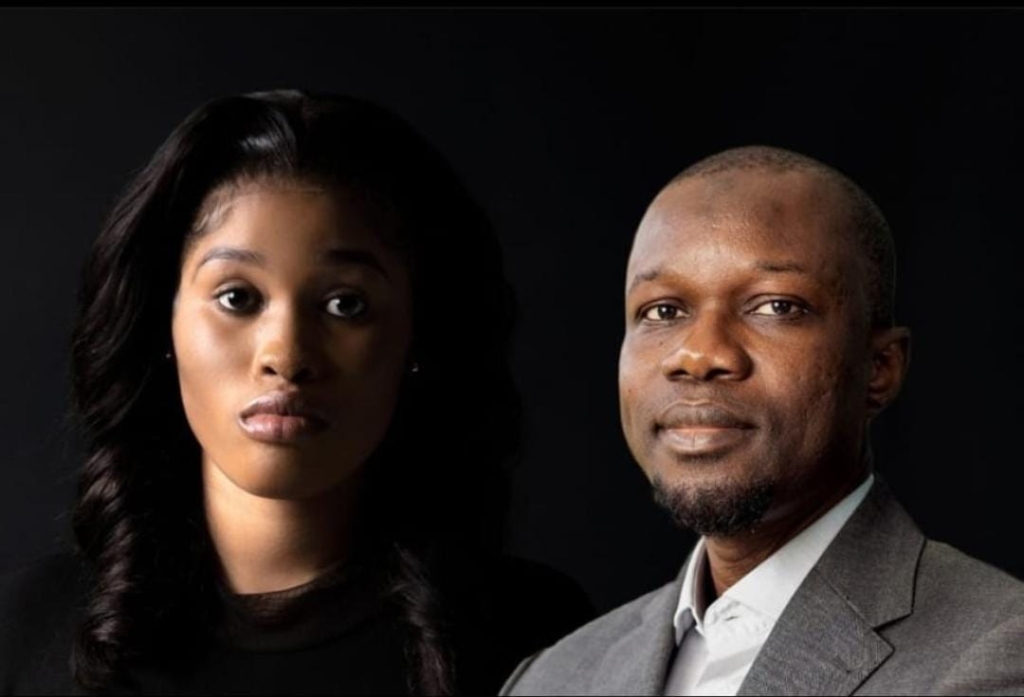In Senegal, electoral prospects have dimmed for anti-LGBT politician Ousmane Sonko, who was sentenced to two years in prison on June 1 for “corruption of youth”.

This photo montage shows Adji Sarr (left) and Ousmane Sonko (right). Sarr ‘s accusation that Sonko raped her led to his conviction for “corruption of youth” (Photo illustration courtesy of @senego / Clément Tardif / Jeune Afrique)
Should Senegal’s LGBT+ community celebrate? Erasing 76 Crimes posed that question to two gay Senegal citizens, whose answers are below.
The interviews come during an ongoing political and security crisis in Senegal, triggered by Sonko’s conviction. To date, more than 16 people have died, hundreds have been arrested, and spontaneous demonstrations continue.
Sonko ran for president in 2019, losing to President Macky Sall. He attracted 15 percent of the vote, which landed him in third place. He has remained active in Senegal politics and has been viewed as a potential candidate in the February 2024 presidential election. But then he was accused of rape by a former massage parlor employee in Dakar. That accusation led to his conviction on the morality charge.
At this stage, it remains to be seen whether Sonko will be declared permanently ineligible for the duration of his prison sentence. Nevertheless, his chances of competing successfully in next year’s elections are highly compromised.
His supporters say Sonko’s trial was part of a Machiavellian ploy hatched by the clan of current President Sall, who is rumored to be planning to run for a third term.
The LGBT+ community members interviewed for this article did not expressed any anti-Sonko partisanship:
Erasing 76 Crimes: Ousmane Sonko has repeatedly stated that, once elected to his country’s highest office, he would considerably toughen the criminalization of homosexuality in Senegal. Are you happy about his prison sentence and possible ineligibility?
Ignace Samb Sy (pseudonym): Being LGBT+ doesn’t mean being unjust. We mustn’t make Ousmane Sonko unjustly ineligible by falsely accusing him and depriving him of his movements for 2 years. Sonko has done nothing, he has the right to stand for election, where he belongs. He needs to be able to explain his program and his vision for Senegal, and if the Senegalese feel more in tune with his ideas, they’ll vote for him. I don’t think we should deprive the Senegalese population of the choice and the opportunity to support an alternative.
In Senegal, we have a lot of challenges to face before having to take an interest in LGBT+ issues, I’m sorry to have to spell it out like this, even though I’m gay myself. Here, we have an economic challenge, an independence challenge to meet. For me, this question is a dilemma, because I’m not unaware of Sonko’s positions on homosexuality. But in all honesty, I prefer Sonko’s program for Senegal, particularly in the fight against corruption, which is one of the great scourges in this country.
Erasing 76 Crimes: Do you think the current events could have an impact on the LGBT community?
Sidy D.: What’s happening right now has nothing to do with the LGBT+ community. It’s about two antagonistic political groups vying for power, and it’s a serious time. There have been internet blackouts and there are deaths.
Source: African Human Rights Media Network member Erasing 76 Crimes.
COMMENTS